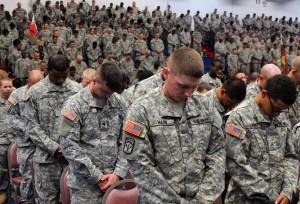Common Careers Christians May No Longer Hold in America
American Family Association has published a list of 7 common careers Christians may no longer hold in America.
This change is due to mounting pressure to prevent Christians from operating their business-life in a manner congruous with their faith-life.
American Family Association writes:
- Photography – A Christian photographer in New Mexico was fined $6700 for politely declining to photograph a lesbian commitment ceremony. The Supreme Court allowed this fine to stand.
- Baker – A Christian baker in Oregon is facing both civil and criminal penalties, including jail time, for politely declining to bake a cake for a gay wedding ceremony. Her business has closed. (more…)

 Last week the U.S. Department of Defense (DOD) approved a new policy to allow accommodation for religious expression in the military.
Last week the U.S. Department of Defense (DOD) approved a new policy to allow accommodation for religious expression in the military.